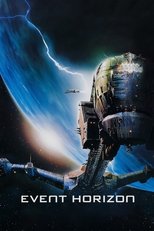Matt Golden
Jul 21, 2013
In the year 2040, a spacecraft called the Event Horizon was sent out to journey among the stars with an experimental gravity drive that purported to allow faster-than-light travel. On its maiden voyage, however, it vanished. Seven years later, it has returned, orbiting Neptune, and a rescue crew is sent out to investigate, along with the scientist responsible for the ship’s creation. The rescue crew of the Lewis and Clark are a group of no-nonsense blue-collar workers, led by Captain Miller (Laurence Fishburne), with Dr. William Weir (Sam Neill) along for his expertise. When they arrive at the Event Horizon, they find the crew long dead. “This ship is a tomb,” judges Captain Miller at one point. The rescue team begins to realize that the ship passed through a black hole created by the gravity drive, but didn’t return alone. The ship with a long-dead crew shows life signs. The rescue team begins to have terrifying visions. The gravity drive begins to spin of its own accord...
Something is loose on the ship, and the rescue team has to not only unravel out what happened to the original crew, but also protect themselves from the horrors that returned with the ship. It’s a simple but sturdy setup, standard B-movie stuff. What elevates Event Horizon is its first-class production design and solid atmosphere. Paul W.S. Anderson (Mortal Kombat, Resident Evil, Alien vs. Predator) is not a name one would generally associate with good film product these days, but here he managed (in spite of himself, one may think given the rest of his output) to present a film steeped in suspense, with strong performances, gorgeous set pieces, and palpable horror.
Let’s be honest: there’s nothing new here. The strength of this film lies in how it fits together the pieces it stole from other films. This is very much (and very completely) The Shining by way of Alien, even to the point of lifting the character archetypes directly from Ridley Scott’s 1979 masterpiece. The Event Horizon is the Overlook Hotel, teeming with supernatural power and malice. The film delves into gore in its last third, but it’s not quite proficient enough to have it enhance the scares (which were doing just fine before the blood started flowing so freely). However, the film is even structured like Alien and The Shining, all slow burn and building dread until things begin to go to hell (literally, perhaps). The cast have stock characters but they bring them to life admirably, particularly Neill and Fishburne; among the secondary characters, Kathleen Quinlan, Jack Noseworthy, and Sean Pertwee are particularly memorable. The script by Philip Eisner is derivative but effective, and Anderson was clearly at the peak of his directorial prowess here. Don't misunderstand me to say that the film's lifts from other works make it bad; it's certainly not. Originality is overrated as an attribute, and fairly value-neutral even on the best of days. I'd much rather have a tale well-told than one that does weird things simply for the sake of doing weird things (French sci-fi/fantasy directors, I'm looking at you. Yes, you, Jeunet), though the greatest films find a way to combine both sturdy storytelling and originality in the medium. In total, Event Horizon is a very effective sci-fi horror film, breaking no new ground but doing what it does very well. A minor classic of the sci-fi horror genre.
